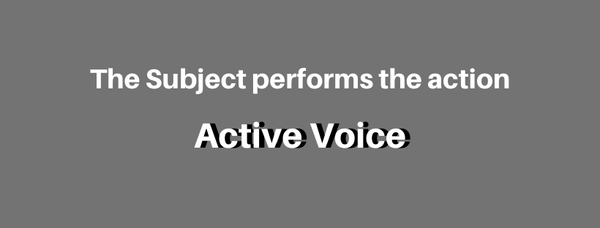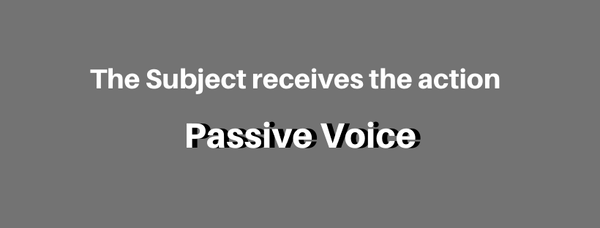How do you know if a verb is Passive or Active?
You have probably heard of the terms Passive Verbs and the Passive Voice, but do you actually know what they mean?
Do you know how they relate to Active Verbs and the Active Voice?
You’ll be relieved to know that you can understand the difference by asking just one simple question. Is the subject performing the action or receiving the action of the verb?
Before we go any further, it is important to understand what both Subjects and Action Verbs actually are.
Subjects tell us who or what a sentence is about. Jack walked
Action Verbs describe actions. Jack walked
When the Subject performs the action, this is known as the Active Voice.

When the subject of a sentence is performing the action of the verb, then the sentence is written in the Active Voice. In the following examples, the Subjects are underlined.
The choir sang a song.
The class took a test.
The storm damaged the buildings
In all of the sentences above, the Subject is performing the action, so all of the sentences are Active.
When the Subject of a sentence is receiving the action of the verb, this is known as the Passive Voice.

Take a look at the following sentences and you will see that the Subjects are not doing anything. They are not performing an Action, they are receiving an Action. Subjects are underlined.
The song was sung by the choir.
The test was taken by the class.
The buildings were damaged by the storm
When using the Passive Voice, it is not necessary to include the doer of the action (by the choir, by the class or by the storm). Notice that the sentences below don’t give any indication about who or what performed the action.
The song was sung.
The test was taken.
The buildings were damaged.
But, do these sentences sound OK to you?
Most English speakers would say that these sentences sound weak and the people using them sound strange.
So, why does the Passive Voice exist?
Mainly, the Passive Voice is used when you don’t know who performed the action.
My car was stolen.
Or when you want to highlight the receiver of the action, rather than the performer. Something that was ‘done to’ a person or thing.
The man was arrested.
And finally, it is used when you do not want to be associated with the action. This is a very neat trick used by politicians everywhere.
The tax was raised.
The country was invaded.
The law was passed.
Should I be using the Passive Voice more?
By default, you should use the Active Voice, however, in any of the above situations, you can and should use the Passive Voice. If you want to gain extra credits for your homework or impress your English teacher, try using the Passive Voice more. It can be an especially useful skill to demonstrate in an English exam such as IELTS and you should try to incorporate it into your essay and speaking.
November 5, 2019

.jpg)



